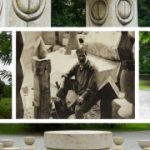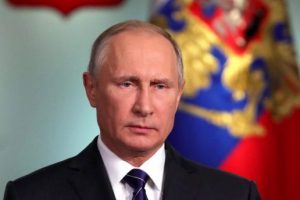“There was of course no way of knowing whether you were being watched at any given moment,” wrote George Orwell in the opening pages of 1984. “How often, or on what system the Thought Police plugged in … was guess work.”
Winston Smith, the pallid and ill-fated hero of Orwell’s dystopian masterpiece, is left under no illusions about the all-encompassing nature of Big Brother’s surveillance society. Placed under the relentless scrutiny of the Thought Police, Smith’s flirtation with free thought and sexual rebellion is ruthlessly expunged.
What Orwell, the Eton-educated author and passionate socialist, could not have known, however, was the uncanny parallel between his nightmarish vision of an all-seeing dictatorship and his own status for more than a decade as a target for the close scrutiny of the British security services.
The personal MI5 file of the literary standard bearer of the British Left, published today after being kept secret for nearly 60 years, reveals how Orwell was closely monitored for signs of treacherous or revolutionary political views by Scotland Yard’s Special Branch from 1929 until the height of the Second World War. While toiling as a cash-starved foreign correspondent and a struggling author, detectives formed the view that Orwell was a louche “bohemian” who held “advanced communist views”.
But while Winston Smith was ultimately crushed in the infamous Room 101, the documents show that Orwell was cleared of any “Thought crime” himself in a clash between the two organisations tracking his conduct. The documents make clear that, rather than condemning the writer as a out-and-out communist, the journalist and novelist was stoutly defended against the Special Branch allegations by his own MI5 case officer.
Released by the National Archives in Kew, west London, the slim Security Service file casts new light on the uneasy relationship between one of the 20th century’s most influential writers and the institutions of the British state, which he frequently criticised as unwieldy and unjust.
Shortly before his death in 1950, Orwell handed a female friend working for an anti-communist propaganda unit in the Foreign Office a list of 35 names of people, including Charlie Chaplin and fellow author JB Priestley, who he considered “crypto-communists and fellow-travellers”. The revelation in 1996 brought allegations that Orwell had betrayed left-wing friends and acquaintances while pandering to the Big Brother tendencies of an Establishment in the grip of what became the Cold War.
Little did Orwell know that his relationship with the more shadowy elements of the British state had begun more than 20 years earlier while he was scratching a living in Paris as a freelance correspondent for several British newspapers, including the Daily Express, after resigning from the colonial Indian Police Service.
The MI5 documents show the extent of the anti-communist surveillance network set up by the British to monitor Soviet influence by citing an unnamed informer in the French capital who warned Special Branch in 1929 that Orwell, at the time a complete unknown to the authorities, had offered his services to Workers’ Life, later the Daily Worker, the official paper of the Communist Party of Great Britain.
The informer sought to substantiate any suspicion by reporting that the author of Animal Farm and 1984, who was still using his birth name, Eric Blair, and only used Orwell as his literary pseudonym, was to be found in Parisian cafés reading left-wing newspapers and had, supposedly, not mixed with French communists to avoid attracting the attention of the Parisian authorities.
The file makes it clear that the interest in Orwell, who was the son of a senior civil servant in the Raj, was heightened because of his abrupt departure from his post in the Indian police. He had resigned his post a year earlier while on leave in London.
A subsequent Scotland Yard report hinted at his status as a suspected potential dissenter, stating: “Blair gave no official reason for terminating his appointment but is reported to have told his intimate friends he could not bring himself to arrest persons for committing acts which he did not think were wrong.”
The episode, which came seven years earlier than any previously known surveillance of the author, was the beginning of a series of regular appearances by Orwell in the annals of anti-communist surveillance by Special Branch over 13 years. His passport application in 1936, carefully copied into his Security Service file, described him as: “6ft 2in, eyes grey, hair brown, tattoo marks on backs of hands.” When asked to state why he needed the passport, Orwell wrote “for the purpose of amusement [and] gathering literary material”.
But it was the arrival of the journalist in the less exotic climes of Wigan in February 1936 to research a book on the privations of the working classes in the North that next brought Orwell to the attention of Special Branch.
The Wigan chief constable wrote to Scotland Yard reporting that Orwell had attended a communist meeting in the town and been found accommodation by local party members while collecting information on matters from the number of churches to the state of the surrounding mines.
In return, the Yard sent a detailed account of its information on the “ex-Indian policeman/journalist”, explaining how he had spent time researching “Down and Out in London and Paris, his account of life as a derelict, before returning to Britain to work as prep school teacher before becoming ill in 1933 “principally through his experiences as a ‘down and out'”.
The steady stream of memos from Special Branch, which included reports on Orwell’s female acquaintances and his visits to a friend who owned a bookshop in Hampstead, continued until January 1942, when the author seems to have set alarm bells ringing by complaining about a security vetting process while working for the BBC.
Orwell, who used his experience of heading the unit responsible for wartime broadcasts in English to India as the basis for the Ministry of Truth and Room 101 in 1984, made clear his displeasure when the Indian Office turned down a friend and Marxist novelist, Mulk Raj Anand, for a post and vowed to challenge the decision.
On the basis of that and Orwell’s attempts to recruit two more Indian intellectuals to his unit, a Yard detective reached some steadfast conclusions about the author’s politics. A report from a Sergeant Ewing said: “This man [Orwell] has advanced communist views and several of his Indian friends say they have often seen him at communist meetings. He dresses in a bohemian fashion both at his office and in his leisure hours”
Orwell experts have long pointed out that while he was unapologetic in his embrace of socialism, at one point supporting the formation of a socialist government by “revolutionary means”, he was deeply opposed to Soviet communism, not least due to his experiences while fighting in the Spanish Civil War, when he became deeply anti-Stalinist.
But the documents show that support for Orwell came from an unexpected source while he was still working for the BBC. Noting that his recent books had been printed by the avowedly anti-communist publisher Victor Gollancz, whose Left Book Club funded his visit to Wigan, MI5 flatly contradicted the findings of Sergeant Ewing and his superiors.
It was Orwell’s case officer, named only as W Ogilvie, who was to play down the bulk of the speculation. Writing in February 1942, he said: “He has been a bit of an anarchist in his day and in touch with extremist elements. But he has lately thrown in his lot with Victor Gollancz who, as you probably know, has severed all connection with the Communist Party. Blair undoubtedly [has] strong left wing views but he is a long way from orthodox communism.”
In a separate note, the Security Service officer ridiculed his Special Branch colleague’s grasp on the subtleties of left-wing political theory. Ogilvie wrote: “Sgt Ewing described Blair as being ‘an unorthodox communist’ apparently holding many of their views but by no means subscribing fully to the party’s policy.
“I gathered that the good Sergeant was rather at a loss as to how he could describe this rather individual line, hence the expression ‘advanced communist views’. It is evident from [Orwell’s] recent writings … that he does not hold with the Communist Party, nor they with him.”
The documents suggest that the rebuff was sufficient to curtail the Yard’ s interest in Orwell, who was rapidly becoming an established author but was still to write his two best-known books, 1984 and the anti-Stalinist allegory Animal Farm. The only subsequent memos on the file relate to a routine security check on his wife, Eileen, who died during surgery in 1944, and a request for Orwell to be given press accreditation for a visit to Allied Forces headquarters in North Africa in 1943.
But students of Orwell believe he would have been astonished at the closeness and the extent of the scrutiny of his private life. His biographer, Bernard Crick, said: “It is clear from these documents that Orwell was being watched as early as the late 1920s, when he was a complete unknown. It says something about how worried, or indeed almost paranoid, the British state was about communism.
“Orwell made it clear he expected there would be a file on him but he also thought it would have contained little more than his service record with the Indian police. In my opinion, he would have had absolutely no idea that he was being watched to this extent.”
Indeed, Orwell was close to the cloak and dagger world of espionage throughout his adventures. It emerged last year that the commander of his militia unit in Spain was an agent for MI5 and the Vichy regime that controlled southern France on behalf of the Nazis.
Georges Kopp, who was a close friend of Orwell and helped to save his life when he was shot in the throat by a Francoist sniper in 1937, worked for both the British and the French during the Second World War. It was also long thought he had an affair with Eileen Blair, who accompanied her husband to Spain but that was recently dispelled in a letter written by Eileen.
The revelations that MI5 believed Orwell was not seeking to undermine the British state after all will cast further light on his motivation for supplying his list of 38 names to Celia Kirwan, a glamorous friend working for the Information Research Department, a semi-clandestine Foreign Office unit set up to counter Soviet propaganda.
His death-bed classification of eminent figures such as the historian EH Carr as an “appeaser” or the actor Michael Redgrave as a suspected crypto-communist was widely held to blacken Orwell’s name as an informer. His defenders point out that the literary “Cold Warrior” was acting to safeguard a democratic system against what he considered a potential Soviet insurgency.
Whether he would have changed his mind had he known the Big Brother tendencies of the country he ultimately sought to defend is unclear. Professor Crick said: “Orwell rather over-cooked his own image as the plain man who solely wrote about his own experience. He read everything he could on the Nazis and Communists. That was the basis for the world he describes in 1984. I think he would have been rather surprised to know he was being watched in Britain.”
Cahal Milmo
sursa: http://www.independent.co.uk/arts-entertainment/books/features/big-brother-how-mi5-kept-watch-on-orwell-463837.html












Adauga comentariu